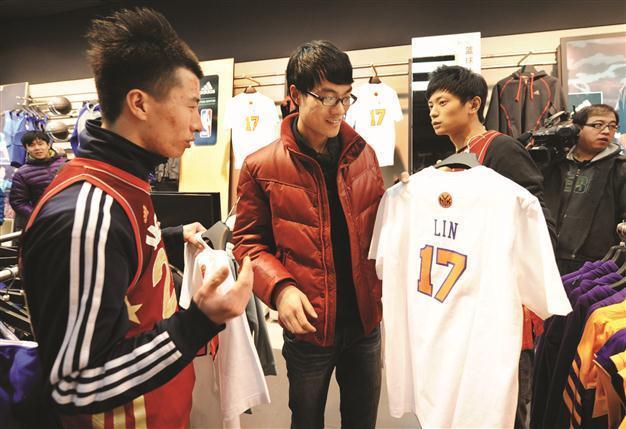Trademark dispute looms over ‘Linsanity’
BEIJING-Reuters

Chinese basketball fan Li Fengzhan (C) prepares to buy a New York Knicks guard Jeremy Lin T-shirt as they go on sale at a sporting goods store in Beijing. AFP photo
The New York Knicks may have given Jeremy Lin his break in the NBA, but a sports ball maker in eastern China saw potential in the Harvard-educated Chinese-American more than a year and a half ago -- and quietly registered his trademark for $700.The issue is the latest in a series of China trademark troubles for Western sports stars and companies that have ensnared American icons ranging from basketball star Michael Jordan to Apple’s iPad in recent disputes.
Registering is cheap and relatively easy, and since Chinese law favors those who register trademarks first, squabbles over them can prove thorny to unravel, legal experts said.
Lin, 23, the son of Taiwanese immigrants who had been cut by two NBA teams before getting his chance with the Knicks, rocketed from obscurity to worldwide celebrity this season, coming off the bench to spark a team that had been forced to play without its top players.
But before Lin got hot, in July 2010, Wuxi Risheng Sports Utility Co, which makes about one million basketballs, volleyballs and footballs a year, registered his name as a trademark.
The company applied to trademark a variation of Lin’s name, “Lin Shuhao (in Chinese characters) Jeremy S.H.L. (initials of Lin’s Chinese name)”, according to the website of the trademark office of China’s State Administration of Industry and Commerce.
The application was approved in August, with the company paying just 4,460 yuan ($710) for the rights and creating a headache for Lin and his corporate partner Nike, with which he signed a three-year contract in 2010.
Nike and Lin could not be reached for immediate comment.
China’s relatively relaxed trademark policies could prove costly for Lin, whose $800,000 salary this season is modest by NBA standards. Forbes SportsMoney said on its online edition that he is worth $15 million.
“In China, first-to-register gets the rights. You may have an idea, and you can register its trademark without ever using it. Unlike in the U.S., where one must first show actual use or an intention to use before one can apply for a trademark,” Horace Lam, Beijing-based intellectual property partner of global law firm Jones Day, said in an interview.
“This trademark will be difficult to take from Risheng because Risheng applied for these trademarks ... for use in the same products that Nike sells: a wide array of athletic apparel and sports equipment.
“Nike and Jeremy Lin could buy the trademark from Risheng, which could potentially cost millions of RMB,” Lam said.
Nike Inc started selling Jeremy Lin-themed shoes on its website and launched its “Linsanity” line of clothes at Foot Locker Inc stores this month, cashing in on the point guard’s fame.
Lin himself is applying for a trademark in the United States to the term “Linsanity”, widely used to describe his meteoric rise, according to the U.S. Patent and Trademark Office.
Lin’s is the latest in a series of China-related trademark disputes that have arisen. Last week, basketball legend Michael Jordan filed a lawsuit in China against Qiaodan Sports Co, accusing the firm of unauthorized use of his Chinese name and jersey number.
Jordan is known as “Qiaodan” in China, where basketball is one of the most popular sports with its own superstar, Yao Ming.
In another high-profile case, a unit of Proview International Holdings has sought to stop Apple Inc from using the iPad name in China, filing a lawsuit in California.
Last week, a Shanghai court threw out Proview’s request to halt iPad sales in the city. But the outcome hinges on a high court in the southern province of Guangdong, which earlier ruled in Proview’s favor.
















